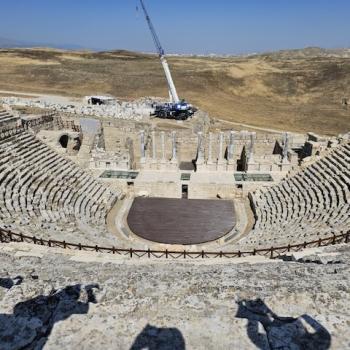Certainly one of the more important topics to be discussed when it comes to eschatology is ‘the day of the Lord’ or ‘the day of Jesus’ and on pp. 1079-80 Tom provides a helpful listing of references to ‘that day’ ranging from 1 Cor. 1.8;5.5;2 Cor. 1.14; 1 Thess. 5.2; 2 Thess. 2.2; Phil. 1.6,10; Phil. 2.16; Rom. 2.5,16; Rom. 13.12; 1 Cor. 3.13; Ephes. 4.30; 2 Tim. 1.18; 2 Tim. 4.8. In every case this is a reference to the future coming of Christ to judge the world, including judging the works of Christians and the rewarding of good works. It is then not correct to say that ‘this day’ has been split into two parts– the first and second comings of Christ. Those coming had different functions in various ways. While we are at it, it is also not quite the case that the Kingdom or resurrection has been split into two either. Kingdom as realm which one inherits, enters, or obtains is strictly in the future for Paul (see my Jesus Paul and the End of the world) ‘baseleia’ as reign, for example reign in the human heart which produces love joy etc. is a matter of a reign not a realm which one enters. And it is not the resurrection of Jesus that is split into two, but rather the resurrection of Jesus is the first fruits, and believer’s resurrection is the latter fruits. They are two different events involving different persons. We are not raised in the first case, and Jesus is not raised in the second case. So bifurcation is not really a very helpful way to look at any of these eschatological events. Indeed, when some were suggesting that the day of the Lord had already come, Paul has to correct such an idea — 2 Thess. 2.2 as it simply wasn’t true.
The discussion of the term parousia (pp. 1082-85) is in some ways more helpful. Tom is right that the term itself comes not from the Bible, and right again that it can mean presence or arrival, hence a coming of someone who is then present. He is also correct that this terminology was used both of the royal visits of say an Emperor or a king, and can be used of a deity as well— for example in Josephus Ant. 3.80 cf. 3.203.
Something goes wrong with the discussion however at pp. 1083.ff. While it is certainly true that Christ is spiritually present, in the same way the Spirit is present here and now with and in the believer (Christ in you, the hope of glory), Christ is not bodily present in his resurrection body here and now. Rather he is reigning in heaven with the saints. It is thus not helpful to translate parousia as presence, or the sudden clear manifestation of an already extant presence when it comes to Paul’s discussion of return of the Christ, using the term parousia. For example in 1 Thess. 3.13 we hear about the parousia of both Christ with all his holy ones. Now this surely cannot refer to the manifestation of the ongoing presence of the holy ones and Christ. The holy ones, simply put are not here. They are in heaven, and when Christ returns bodily, they will be coming as well. Hence, parousia in such a text must be translated arrival with the sense of the return of someone who thereafter is physically present. The parousia of Christ is not about it suddenly becoming obvious that Christ has spiritually always been with us. No, it is about the return of the risen Lord. Notice for example how in 2 Thess. 2.1 Paul talks about once Christ has returned and is present again (in some sense that he was not in the immediately prior time) then we will be gathering together around him… or we will be going to meet him in the air as 1 Thess. 4 puts it. In other words, manifestation is not an adequate description of an arrival from elsewhere. Furthermore, if Tom is correct that Paul is riffing off of the use of parousia language by the Emperor’s honorific propaganda, then it needs to be said that that term in that context refers to a royal visit, an arrival, not a manifestation of someone already secretly present.














